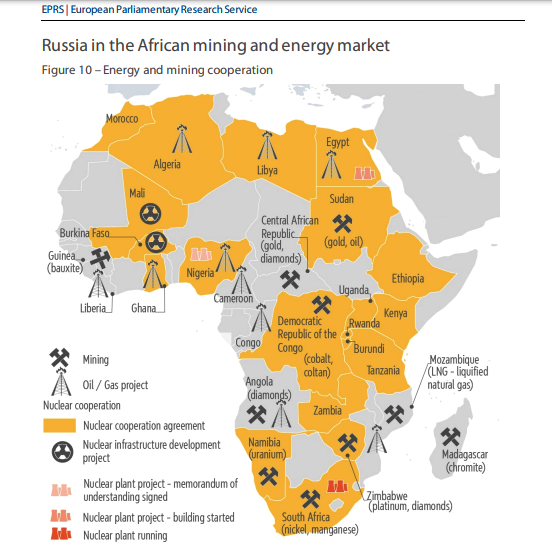
The Africa File provides regular analysis and assessments of major developments regarding state and nonstate actors’ activities in Africa.
The Canadian gold mining company Barrick Gold temporarily suspended mining operations in Mali, and Russia is poised to fill any potential void. Barrick suspended operations after the Malian junta seized over $200 million worth of Barrick Gold stockpiles.
Barrick is the second-largest mining company in the world and owns the contract to the Loulo-Gounkoto mine in southwestern Mali. The mine produced 19.4 tons of gold in 2022 and accounts for nearly a third of Mali’s gold output.
Reuters reported that the loss of the mine would cut Barrick’s annual earnings before interest, tax, and amortization by 11 percent.
Mali and Russia have increased cooperation on natural resource exploitation since March 2024. Malian and Russian officials developed a geological map for better resource exploration on March 21. The two countries then signed a series of agreements for the exploitation of oil, uranium, and gas in northern Mali on March 31.
Malian officials signed a memorandum of understanding with Russia’s Uranium One Group in July 2024 and discussed a joint lithium project with Russian officials at an event in Moscow in late September.
Uranium One Group is a subsidiary of Russia’s state nuclear company Rosatom and is expected to begin lithium exploitation in southern Mali over the next 24 months.
Malian media reported that Russia would begin lithium, oil, and gas exploitation in Mali in October 2024.
Russia used the same strategy that it did in Mali to secure access to uranium sites in neighboring Niger after the Nigerien junta pressured Western mining companies to suspend operations. Bloomberg reported that Rosatom discussed taking over French-controlled Nigerien uranium supplies with Nigerien officials in June 2024.
Nigerien Mining Minister Ousmane Abarchi invited Russian companies to explore Niger’s natural resources in November 2024 and confirmed that he was communicating with multiple Russian mining companies on uranium and other natural resources.
Increased Russian access to mining in the Sahel will boost the Russian economy and mitigate Western efforts to economically isolate Russia. Russia has repeatedly sought to gain access to natural resources — primarily gold — from its partnerships with African countries to help offset the effect of Western sanctions.
Russia does not produce lithium, which is crucial for green energy due to its use in rechargeable batteries for mobile phones, laptops, and electric vehicles.
The United States lists lithium as a critical mineral, meaning that it is important to national and economic security and that global demand outpaces supply.
The People’s Republic of China dominates the global lithium market, but Russia has tried to enter the market through mining deals in Bolivia and may have opportunities to exploit lithium deposits in eastern Ukraine.
Russia’s shift in lithium sourcing comes after Argentina and Chile stopped exporting lithium to Russia in 2022 due to Western sanctions.
The Kremlin’s pursuit of uranium aims to increase its grip on the nuclear energy market to improve its leverage with countries that seek to cut Russian gas purchases.
Niger is the world’s seventh-largest uranium producer, is the second-largest producer on the African continent, and has the highest-grade uranium ores on the African continent.
France could be particularly vulnerable to the loss of access to Nigerien uranium as it relies on nuclear energy for 68 percent of its electricity and has relied on Niger for nearly 20 percent of the uranium it imports to power its nuclear energy facilities over the past decade, although France has tried to diversify its suppliers in recent years.
read more in our Telegram-channel https://t.me/The_International_Affairs

 11:13 26.01.2025 •
11:13 26.01.2025 •






















